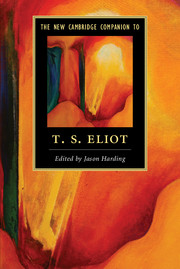Book contents
- Frontmatter
- Contents
- Notes on contributors
- Preface
- Chronology of Eliot's life and works
- List of abbreviations
- 1 Unravelling Eliot
- 2 Eliot: Form and Allusion
- 3 Prufrock and Other Observations
- 4 Banishing the Backward Devils: Eliot's Quatrain Poems and “Gerontion”
- 5 With Automatic Hand: The Waste Land
- 6 “Let These Words Answer”: Ash-Wednesday and the Ariel Poems
- 7 Four Quartets
- 8 “A Precise Way of Thinking and Feeling”: Eliot and Verse Drama 116
- 9 T. S. Eliot as Literary Critic
- 10 T. S. Eliot's Social Criticism
- 11 Gender and Sexuality
- 12 Eliot's Philosophical Studies: Bergson, Frazer, Bradley
- 13 “Anglo-Catholic in Religion”: T. S. Eliot and Christianity
- Select bibliography
- Index
- Miscellaneous Endmatter
4 - Banishing the Backward Devils: Eliot's Quatrain Poems and “Gerontion”
Published online by Cambridge University Press: 01 December 2016
- Frontmatter
- Contents
- Notes on contributors
- Preface
- Chronology of Eliot's life and works
- List of abbreviations
- 1 Unravelling Eliot
- 2 Eliot: Form and Allusion
- 3 Prufrock and Other Observations
- 4 Banishing the Backward Devils: Eliot's Quatrain Poems and “Gerontion”
- 5 With Automatic Hand: The Waste Land
- 6 “Let These Words Answer”: Ash-Wednesday and the Ariel Poems
- 7 Four Quartets
- 8 “A Precise Way of Thinking and Feeling”: Eliot and Verse Drama 116
- 9 T. S. Eliot as Literary Critic
- 10 T. S. Eliot's Social Criticism
- 11 Gender and Sexuality
- 12 Eliot's Philosophical Studies: Bergson, Frazer, Bradley
- 13 “Anglo-Catholic in Religion”: T. S. Eliot and Christianity
- Select bibliography
- Index
- Miscellaneous Endmatter
Summary
In the latter half of a war-torn decade, Eliot produced scores of reviews and essays but published only a handful of poems. While the most influential of his polemical pieces went on to shape literary discourse, the quatrains of Poems (1920) made but a negligible impression. In the wake of the positive reception of Prufrock and Other Observations, Eliot's formal experiments struggled to find an audience. Early critics of the quatrain poems thought them novel but “fatally impoverished of subject matter,” or fit only for “readers in the waiting-room of a private sanatorium” (Brooker 21, 47). Eliot was stung by the reception of his new poetry, which he hoped could take him beyond the burdensome success of “The Love Song of J. Alfred Prufrock.” In a letter to his brother he reveals his estimation of the new work: “some of the new poems, the Sweeney ones, especially ‘Among the Nightingales’ and ‘Burbank’ are intensely serious, and I think these two are among the best that I have ever done. But even here I am considered by the ordinary Newspaper critic as a Wit or satirist, and in America I suppose I shall be thought merely disgusting” (L1 441).
Subsequent criticism has done little to rescue the quatrain poems from the early charges that were laid against them. They have been denigrated as plagiaristic, pseudo-scholarly and preparatory; they are seen to have little in common with the lyrical and psychologically poignant poems that stand on either side of these experiments. Yet Eliot's choice to trade free verse for the tautness of cross-rhymed tetrameters was deliberate. According to Ezra Pound, with whom Eliot scrutinised Théophile Gautier's quatrain poems in Émaux et Camées between 1917 and 1919, the two poets sought a way of addressing the lax formalism of their contemporaries. Eliot, perhaps less concerned with the general state of poetry than with framing his own thoughts, conceded in an interview that the “form gave the impetus to the content.” The statement is as cryptic as the content of the poetry is varied: subject matter ranges from sexual debasement to the tepidity of institutionalized religion, and the only common denominator would seem to be rhyme and rhythm. But the textual history of the quatrain poems suggests that they are also unified by an undercurrent of personal pain.
- Type
- Chapter
- Information
- The New Cambridge Companion to T. S. Eliot , pp. 55 - 70Publisher: Cambridge University PressPrint publication year: 2016

